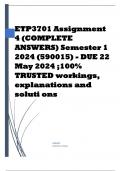ETP3701 Assignment
4 (COMPLETE
ANSWERS) Semester 1
2024 (590015) - DUE 22
May 2024 ;100%
TRUSTED workings,
explanations and
soluti ons
ADMIN
[COMPANY NAME]
, CASE STUDY Agripreneur: Ngwamba turns agricultural trash into burning
treasure With a passion for sustainability and innovation, Given Ngwamba
transformed adversity into opportunity, creating Nzilo Charcoal and paving the
way for eco-friendly grilling solutions. Years ago, Given Ngwamba’s garage in
Ka-maqhekeza, Mpumalanga was transformed into an impromptu innovation
hub, filled with homemade machines that would ultimately bring his ground-
breaking idea to fruition. He wanted to create coal using agricultural waste
such as groundnuts, sugarcane, macadamia shells, coconut, and waste from
mango leaves and banana trees. The idea came after Ngwamba found
himself at a crossroads in 2019 after a failed business venture left him
seeking a new beginning. “We built our own machines and experimented with
different materials. It wasn’t easy, but we were driven by the potential impact.
“We’ve gone from a handful of friends tinkering in a garage to a growing team;
employment opportunities in our community are incredibly rewarding,” he
says. Turning waste into wealth The name of Ngwamba’s business is Nzilo
Charcoal, which means “hope” in the local dialect. He sells his
environmentally-friendly briquettes to local retailers like Vleis Paleis Nelspruit
and Naas SuperSpar for R37 per bag who add their markup. Those who buy
directly from Ngwamba pay R50 per bag. At the core of Nzilo Charcoal lies the
principle of agricultural sustainability by repurposing waste into valuable
resources for producing cleaner-burning charcoal. In a meticulous process,
Nzilo Charcoal begins by gathering agricultural waste such as sugarcane
husks, corn stalks, and woodchips from nearby farms. “This waste becomes
the fuel for our eco-friendly briquettes,” Ngwamba explains. These raw
materials undergo a transformative journey starting with sun-drying, an eco-
friendly technique that harnesses the power of natural sunlight. Once
thoroughly dried, the material is then subjected to carbonisation within
specially designed kilns, where it undergoes a metamorphosis into charcoal.
The final stage of this artisanal process involves Nzilo Charcoal’s handcrafted
machines that compress the carbonised material into dense briquettes. This
careful sun-drying process over several days not only ensures the purity of the
end product but also guarantees clean-burning charcoal, Ngwamba says.
“Our briquettes burn cleaner, releasing fewer harmful emissions.” Ngwamba’s
vision for a greener tomorrow The road to success was not paved with ease.
Limited access to funding and machinery presented a constant hurdle. The





